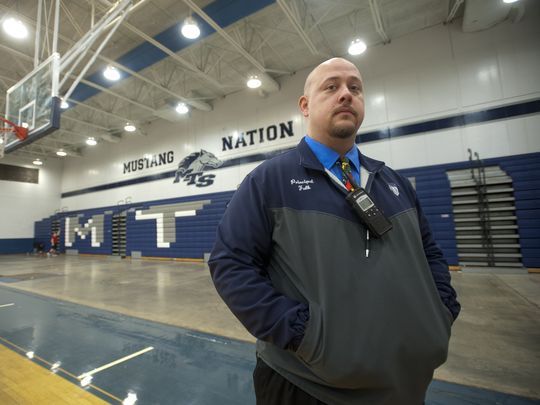by Grace Schneider
Click here to view the full article
Take a look at a few things that teachers object to in proposed pension reform in Kentucky. Mary Ann Gerth/Louisville Courier Journal

Rob Fulk, the principal of Marion C. Moore Middle-High School, chats with 6th grader Isaiah Lewis, 12, in the school’s hallway. Jan. 18, 2018
(Photo: David R. Lutman, Special to Courier Journal)
Jan Taylor strolled into a classroom in Trimble County in her mid-20s and discovered she’d found her calling. Working with young children to get them ready to start school challenged and inspired her, and she loved every minute.
Thirty years later, she’s still excited about what she does – teaching middle school students at Minor Daniels Academy in Louisville, where many of the kids have behavioral problems.
But she plans to walk away from it in November when she turns 55, worried that she can’t risk having her pension benefits trimmed.
“If I’m going to get a bad deal,” Taylor said, “I’ll leave right away.”
It’s a theme heard across Jefferson County Public Schools as teachers monitor how Gov. Matt Bevin and lawmakers propose to tackle an estimated $41 billion shortfall in the state pension system as they try to put all eight plans on the path to solvency.
Worried that their benefits could be cut, dozens of teachers have told their supervisors they’re likely to leave this year or in the next few years, according to several principals and teachers.
JCPS and the Kentucky Teacher Retirement System can’t say exactly how many teachers will leave, but administrators have been making calculations based on who’s eligible for retirement now and how many additional teachers could leave next year and beyond.
The number of possible retirements “is something that really concerns us,” said Marty Pollio, the district’s acting superintendent.
The retirement system estimated recently that of about 9,580 certified teachers, administrators and other staff members with four-year degrees in Jefferson County Public Schools, 1,380 could retire right away. Most are age 55 or older and have 27 years of service in the system.
In the next five years, more than 3,100 will be eligible, said Beau Barnes, legal counsel for the teacher retirement system.
“If I’m going to get a bad deal, I’ll leave right away.”
– Jan Taylor, teacher
Pollio said any vacancy causes a ripple effect, opening a slot at a school that often leads to a transfer and an opening at another school. “We’re really worried about it more from a systemic standpoint,” he said.
JCPS is looking at which schools have veteran staffs and how a surge in retirements might impact them.
Based only on a count of teachers who started their careers in the district, JCPS data show that 10 elementary schools have three or more teachers eligible to retire – Tully, Stonestreet, St. Matthews, Schaffner Traditional, Luhr, Lowe, Gutermuth, Foster Traditional Academy, Bowen and Bloom.
Jefferson County High School and Male High were listed with three or more, as were Barret Traditional, Noe and Jefferson County Traditional middle schools.
These calculations don’t include teachers who started in another district and transferred to Jefferson County. (The district said it could not produce a comprehensive list of all employees who might be eligible.)
But a random survey of high school, elementary and middle school principals revealed that some could lose up to a fifth or more of their faculties.
Some of the proposals in the pension reform debate may be crucial in whether teachers decide to retire sooner rather than later. They include:
Barnes, of the retirement system, said that those provisions have prompted many teachers to pinpoint dates in the next three to five years to get out before summer of 2023.
“We’re really worried about it more from a systemic standpoint.”
– Acting Superintendent Marty Pollio, on potential mass retirements
Meanwhile, the budget Bevin proposed this month does not include money for retired teachers’ health insurance, which would impact those who don’t qualify for Medicare yet.
The budget proposal calls for more than $3.3 billion to fully fund all pension obligations for the next two years, but Bevin Budget Director John Chilton said that “there was just not enough funding” available to pay for all needs and requests when putting the budget together.
Tim Abrams, executive director of the Kentucky Retired Teachers Association, said in a news release this week that the proposed cut would be “devastating for a retired teacher on a fixed income.”
He said under the proposal “a single teacher drawing a pension of $3,000 a month could pay up to an additional $500 a month for health insurance, which adds up to $6,000 per year.” Affected retired teachers under a “parent plus” plan would pay $800 a month more, or $9,600 a year, he said.
Principals at several schools said the loss of veteran teachers would have a dramatic impact on the classroom instruction because of their years of experience and training.
At Brown School in downtown Louisville, for instance, officials have made a “huge investment” in training teachers in techniques that enhance deeper learning for students and more self-directed work, principal Angela Parsons said.
She said two teachers already have said they’ll leave at the end of this academic year, and others are in line to follow in the next few years.
At Marion Moore in Highview, Rob Fulk projects up to five retirements at the end of this year and 12 to 15 teachers will go out the door in the next three years.
He said he has hired 120 teachers and other staff at the sprawling campus, which serves nearly 2,170 students in grades six to 12, since early last summer.

Rob Fulk, principal of Marion C. Moore Middle-High School stands in the school’s gym. Jan. 18, 2018 (Photo: David R. Lutman, Special to Courier Journal)
The turnover on top of all the other attrition “really hurts morale. It hurts consistency,” Fulk said. “What’s the hardest thing is the uncertainty around” the pension situation.
Already, it’s getting hard to fill the slots, he said, but this year’s retirements include teachers in math, science and special education — fields in which teachers traditionally are in high demand.
Bell, the Manual retiree, said she doubled down on investing in a separate 403b retirement account eight years ago to supplement her pension because she questioned whether thestate pension fund would stay solvent till she retired.
The Highlands resident is part of a group of educators that has filed three lawsuits centered on Kentucky’s teacher retirement system. They have alleged that funds have been poorly invested and that the state shirked its duty to consistently contribute to the teacher’s system, to no avail.
Bell said she had planned to retire this June, but she said that was before Bevin went on Facebook last August and derided teachers who “hoard” sick days and who were retiring in response to recommended pension system changes.
That caused her to jump ship. Outraged, Bell contacted the retirement system and arranged to leave in December.
“I thought, you know what? I’m leaving,” she said. “I don’t want to work for you anymore.”
Taylor echoed the sentiment. After more than 30 years of giving her all to youngsters, she said she feels teachers have become disrespected, a target of resentment and derision.
She’s also afraid for what’s ahead for younger people eager to serve. She and other educators knew they’d make less during their careers, assured that the pension would balance out the compensation after retirement.
Taylor said she worries about younger teachers whose pensions may rely heavily on a 401(k)-style plan promoted by Bevin and consultants. What’s their guarantee? Taylor said, “I don’t know what they’re going to find.”
Grace Schneider: 502-582-4082; gschneider@courierjournal.com; Twitter: @gesinfk. Support strong local journalism by subscribing today: www.courier-journal.com/graces.